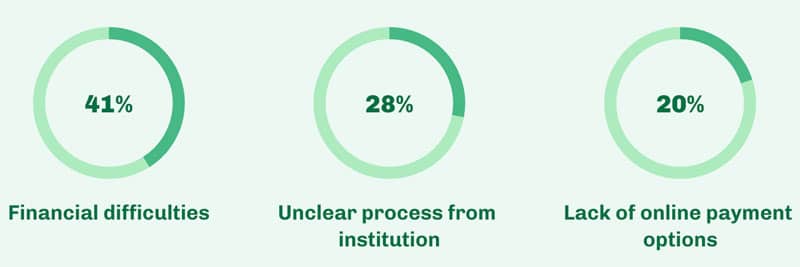After two years at home, demand for study abroad remains strong but practical challenges remain
This special feature is sponsored by Flywire.
With demand high and travel reopening, one of the major challenges left for students on their way to study abroad is getting the visa that will let them do so.
That was the conclusion of independent research of more than one thousand students surveyed by international student payment provider Flywire to get a better understanding of the state of global education as the industry emerges from a once-in-a-lifetime pandemic. Students from Australia, Canada, China, the United Kingdom and the United States – five of the largest contributors of students to the global education market – offered their thoughts on whether the pandemic and the global political environment would affect how they got a visa.
Overall, the results were a positive signal of optimism about the pandemic visa process.
The winds of change
Many visa offices were shuttered during the COVID-19 pandemic, leaving international students and school administrators in the dark about the ability to secure the necessary visas for travel and study. As vaccination rates increase and case rates decline, restrictions are being lifted. There have also been political shifts which will likely impact visa availability and timelines.
Of the students surveyed, 56% thought that the shifting global political climate would change the way they would apply for a visa in the future. In fact, more students were optimistic about the potential changes than were pessimistic, with one-third feeling that the changes would make the process easier, and 23% believing that it will become more difficult.
These findings are supported by policy changes and population trends alike, which signal a strong return of international education. In the US, a recent joint statement by the Department of State and Department of Education on renewed commitment to international education marked the first time in over twenty years that the federal government has taken a positive and proactive approach to support international students. And recent data from RBC shows that the return of international students in the first half of 2021 resulted in Canada's population growing at its fastest rate since the COVID-19 pandemic began.
If there's one thing, we're hearing from students who've been stuck at home it's this: global education is back, and nothing is going to stop them. We've outlined a snapshot of some of the findings below.
US and Australia lead with optimism
At 61%, US students were confident in the notion that the visa process would change. This was followed closely by Australia, where 57% said the process would change. In both regions, the bigger share of respondents believed the overall environment would be easier: 38% in the US, and 34% in Australia. One possibility for the positive trend is the recent election of the Biden administration, whose policies lean more favorably towards globalism and education.
China saw a larger percentage (41%) of students thinking that the process to get a visa will remain the same. The confidence in China’s stability could potentially be attributed to its growing prominence on the world stage.
Even with student ideas on the visa process likely to ebb and flow alongside global politics, the overall attitude towards studying in a different country is a positive sign that students are coming out of the pandemic ready to fly.
Financial concern a reality for many students
Along with practical considerations of securing a visa, many survey respondents reported financial concerns as well. Nearly three in four (72%) said that tuition payments were a “significant” source of stress and a similar proportion (71%) said that they struggled to make education payments due to the financial impact of the pandemic.
The findings point not just to the economic impacts of COVID-19, but also to the need for greater support for students in this arena, including flexibility in payment schedules, clear guidance regarding payments, and streamlined payment processes.
When asked about their leading sources of financial stress, responding students cited financial difficulties (41%), unclear payment processes (28%), and lack of online payment process (20%) as the main areas of concern.

“One concern that has not diminished is the growing cost of education and how to pay for it – both financially and logistically,” notes the Flywire survey report. “The process of making tuition payments continues to be a source of stress for students and families. Many are looking for simpler, more flexible payment processes, and others are looking for assistance in the form of payment installment plan options, and specifically in the US, ways to reduce student debt.”
The complete survey findings, and additional background on methodology, are available online.


















